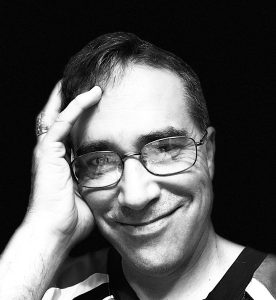During my Ph.D. program, I found myself drowning in the deepest depression of my life — and that’s saying a lot. In college, a misunderstanding with a professor had prompted me to raise my dorm window and think very seriously of jumping. Now, 15 years later, I was having horrible physical symptoms.
The bottom had fallen out when a boss jabbed a finger at my face and screamed at me. The fact I wasn’t guilty of the accusation didn’t matter. My brain ran amok with cognitive distortions.
In the months after the harsh treatment from my boss, I would be hit with waves where my blood felt acidic inside me. Sudden fatigue flattened me. One day I couldn’t lift my feet off the floor to get in bed.
I went to a doctor on campus. I told him I thought I was suffering from depression. Despite my being just 38, he said it would do no good to treat me for depression if I died from a heart attack. I wore a heart monitor for several days. I went to a gastroenterologist who said he was confident I had colon cancer or celiac disease. Scopes ruled out those but found my stomach scarred by several ulcers. After months, a hematologist was my last physiological exam. I hoped he would report the discovery of a parasite I had picked up on mission trips to the Philippines or Haiti. Even if incurable, at least I would know something. But the doctor said, “I don’t know what’s wrong with you, but it’s not your blood.”
Tears filled my eyes as I returned to the unknown.
I drove home and called a member of my dissertation committee; he was a professor of counseling and worked at the campus counseling center. Pushing aside shame, I said, “I’ve told the doctors all along I think I’m depressed. I think I need to see a counselor.” With pleasant matter-of-factness he said, “Sure! Here’s a number.”
I called the number and made an intake appointment. I hung up, collapsed in the floor and sobbed uncontrollably for about 10 minutes. My physical symptoms lifted and disappeared liked morning mist on a summer lake.
In therapy
My therapist, Chrissy, turned out to be a fellow Ph.D. student. I informed her I never had been fully honest in therapy and promised I would be. At the second session, when she asked where I wanted to start, I honestly informed her I needed to address my anger with her. With compassionate curiosity, she nodded for me to continue.
“Last week I told you I was filled with rage. You offered this office as a safe place for me to express my rage.” She somberly nodded; I continued. I’ll omit the profanity in what followed.
“For you as a petite female to invite me to express my rage in here means you don’t find me threatening, and I felt weak when you said that.”
“I grew up very small for my age. I learned to compensate for my size by being intimidating. For you as a petite female to invite me to express my rage in here means you don’t find me threatening, and I felt weak when you said that. I don’t think you grasped what I meant when I said I’m enraged. I want to break things. If I expressed my rage in here, I’d throw this chair through that window. I. Am. ENRAGED.”
With a look of utter concern and regret, Chrissy calmly said, “Clearly, I wasn’t connecting. I’m sorry. Let’s start over. What do you need?”
I audibly exhaled, then inhaled the safety Chrissy offered. Reinspired, I said, “I need a ritual. After each of two miscarriages, my wife and I had friends over, wrote down our pain, dug a hole in the yard, put the written pain in the hole, and then we planted a tree fertilized by our pain. I’m a big believer in rituals. I need a ritual to forgive (someone who deeply hurt family members and me).”
Chrissy respected my pain with silence then ventured, “What if you tape recorded everything you’re angry about.” She gestured over her shoulder toward the Tennessee River. “Then take the cassette tape and throw it in the river?”
Later I reported that to a family member. We shook our heads no and simultaneously said, “Not biodegradable.” I felt so understood. I couldn’t throw a cassette tape in a river; that would be littering. But an axiom of therapy is “the client is the best expert on themselves,” and Chrissy had prompted brainstorming that helped me find what would work.
An eco-friendly plan
Outside my department’s building, there was a large magnolia tree. I picked up a stack of the stiff, oval, dried leaves. With a black marker, I wrote on each leaf the name of someone I needed to forgive. I’d been a Baptist minister for several years. It was a large stack.
“With a black marker, I wrote on each leaf the name of someone I needed to forgive.”
I walked to the middle of the Henley Street Bridge. The wind was blowing west to east as it does most days in Knoxville. I faced east with the wind at my back and, one by one, forgave the person named on each leaf and tossed the leaf to the river. I walked off the bridge feeling lighter and relieved.
The next day, however, during my daily hike from my free parking space to campus, I suddenly felt a deep, aching heaviness. I stopped in my tracks and, since God didn’t seem near, said toward the infinite sky: “What the heck!? I forgave everyone. Why do I still feel like this?”
Suddenly, I realized I had not forgiven everyone I needed to forgive.
Over the years, when using my own story in classes, I have asked students to guess whom I had not forgiven. They have guessed insightful things like “yourself.” Someone once astutely guessed, “God.” But I had written “myself” and even “God” on respective leaves. I forgave myself for a laundry list of issues and God for not being a more protective shepherd of any of us.
However, I had not forgiven the person who most contributed to me wanting to fling myself from a dorm window or throw a chair through my therapist’s window.
Back at the magnolia tree, I picked up another leaf and wrote the perpetrator’s name. I picked up some more leaves just in case I thought of someone else, and I headed back toward the bridge with its iconic arches which, prior to the bridge’s own renovation, met on oval concrete islands — sometimes exposed, sometimes submerged beneath the surface.
It was rush hour. Cars streamed both directions on one of Knoxville’s main arteries connecting two banks of a river where a Civil War battle was fought, with the South fighting from the north bank and the North from the south bank. Things were all turned around. A stiff wind was oddly blowing from east to west — which my father always said was a portent of a fasten-your-seatbelt storm in Knoxville. Thus, this time I wound up facing west.
“A stiff wind was oddly blowing from east to west — which my father always said was a portent of a fasten-your-seatbelt storm in Knoxville.”
I put my elbows on the foot-wide, chest-high concrete guardrail. I held the inscribed leaf in my hand and pictured the named person. I told the person I had previously spoken forgiveness but had been boiling in resentment over how even that conversation had gone. I said I didn’t understand how they had done what they had done but admitted I didn’t know the details of their own story.
I said, “That wouldn’t excuse you, but at least it would make things make some sense. My rage with you is killing me. I have to let it go for my own sake. I forgive you. I hope wherever you are, you are at peace, and I hope if we ever see each other again we’ll be cool with each other.”
With a flick of the wrist, I sent the leaf fluttering toward the river. I planned to watch it drift away downstream toward the seven seas. This final part of the ritual was important to me. The leaf dropped out of sight. Surely the stiff westbound wind would carry my past a good ways downstream before landing on the river’s current. I waited. And waited.
Finally, I pressed myself up on my tiptoes, leaned over the guardrail and peered down. My leaf had landed on the oval concrete island straight below me. Half the leaf hung out over the water running a foot below it. Another millimeter to the right and it would have been on the water.
I slammed my fists on the guardrail and bellowed, “DAMNIT!! I WANT THAT GONE!!”
An intervention
Now, I’m very reluctant to use “God said” language. In my teens a pastor in his 40s, referring to his new job, said to me, “God told me I would retire at this church.” He was there less than three years. It made an impression on me not to mistake mere feelings for spiritual connection. An atheistic psychologist might say what happened next was merely my superego and ego collaborating to quiet my id. A certain type of theist might say I had an epiphany arising from spiritual discipline interacting with my thinking. Another type of theist would say the Holy Spirit acted in the Scripture-described function of comforter.
“I immediately felt an inaudible voice coming into me.”
All I can do is describe my story as I experienced it. After I screamed, “DAMMIT!! I WANT THAT GONE!” I immediately felt an inaudible voice coming into me. “Brad, you did your part. You let it go. I’ll do my part; it’s going to rain.”
A peace and joy instantly filled me like perfect lemonade into a glass on a Tennessee Fourth of July. I slowly began to giggle until I was doubled over in childlike laughter. I straightened up at one point and saw a passing driver look at me with concerned eyes that asked, “What on earth?” I turned toward home and, with almost levitating footsteps, walked off the bridge feeling reborn.
Affirmation
The next day I was out for a run when — in keeping with my father’s prognostication about west-bound winds in Knoxville — a sudden violent wind and rain struck. I topped a hill, and the horizontal rain stung my face. I saw this assault as symbolic of all that pain assailing my life. I stopped my run, threw out my arms and melodramatically screamed, “BRING IT! YOU WILL NOT DEFEAT ME!”
Then, that still, small voice was back. “Brad. It’s raining.”
Immediately, I realized the same pelting rain I initially saw as against me also could purge me. I closed my eyes and accepted the pressure washing. My enraged face dissolved into calm and again blossomed into a smile.
Two days later, I officiated a wedding. After the wedding, I attended the reception aboard the The Star of Knoxville riverboat. I was talking to one of the wedding guests when someone pointed out the window. We were passing under the Henley Street Bridge.
The heavy rains of two days before had raised the water level at least two feet. The concrete island that had held my forgiveness was submerged beneath the river, and the leaf inscribed with my rage was gone.
That day The Star ushered us to a truly grand party.
Brad Bull has served as a hospital chaplain, pastor, professor, UPS driver helper and substitute teacher. He is a licensed marriage and family therapist in Tennessee and Virginia and now works as a mostly-online private practice therapist. When back home in Knoxville, he often makes a sentimental journey to a particular magnolia tree and casts an eye toward The River.
Related article:
Thanks to the college student who prescribed me an anti-pride-essant | Opinion by Brad Bull



